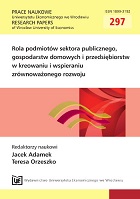Świadomość społeczna mieszkańców w zakresie gospodarki odpadami na przykładzie wspólnot mieszkaniowych
The citizens’ public awareness of waste management on the example of housing associations
Author(s): Ewa SpigarskaSubject(s): Economy
Published by: Wydawnictwo Uniwersytetu Ekonomicznego we Wrocławiu
Keywords: waste segregation; environment; community; housing associations
Summary/Abstract: The change in legislation, and requirement to adapt to the EU regulations obliged Poland to the mandatory waste segregation. From 1 July 2013 the municipality has taken the responsibility for the management of municipal waste, especially in terms of segregation. The motivation for the people to segregate will be based on varied fees for waste disposal, depending on the degree of segregation. At the same time the National Waste Management Plan to protect the environment presents guidelines for the integrated waste management in the country. The main goal of all activities is to reduce the impact of wastes on the environment and the efficient use of natural resources through their reuse. It is also about public behaviour change in waste management to be able to use high level of recycling. In line with the policy of the European Union, each state in the area of waste management should implement the principles of sustainable development. This means limiting the amount of waste produced and to organize the proceedings for the collection and management of waste produced. But the most important thing is the awareness of people − “waste producers” = proper waste segregation and their impact on the environment, and therefore their quality of life. This awareness, rather than export costs, should be the principal argument for the waste segregation.
Journal: Prace Naukowe Uniwersytetu Ekonomicznego we Wrocławiu
- Issue Year: 2013
- Issue No: 297
- Page Range: 290-299
- Page Count: 10
- Language: Polish

